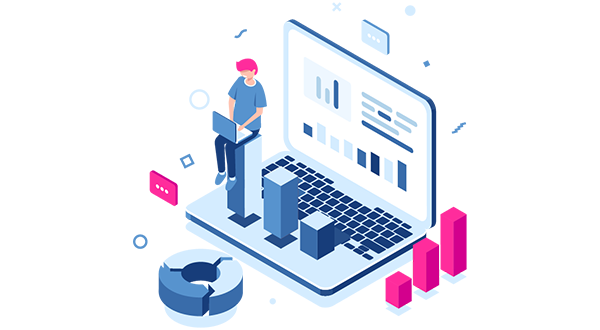

Major Financial Services Company: Migrating Easytrieve to COBOL and modernizing Mainframe JCL

Industry: Financial Services
Headquarters: Europe
Coverage: Nationwide
Our Customer
The Customer is a leading national financial services provider specializing in consumer credit. In operation for over three decades, they have thousands of employees and branches throughout the country. The company offers a full range of commercial and personal financial services including leasing, credit cards, personal and business loans, insurance services and more.
The Challenge
The Customer was experiencing recurring operational and maintenance challenges related to their legacy mainframe-based programs, which were supported by Easytrieve routines and JCL scripts. They wanted to consolidate their technology to COBOL and thereby eliminate dependency on these legacy mainframe tools. In addition to modernizing and streamlining their technology stack, the Customer also wanted to eliminate the infrastructure and licensing costs associated with running these technologies.
The hitch? In the mainframe sector, Easytrieve and JCL are considered "exotic technologies.” As we’ve discussed previously, such technologies are the bane of modernization initiatives, since they’re so often overlooked during the initial system assessment. Because they constitute just a small percentage of the overall technology stack, their criticality is underestimated—until the modernization fails in its final stages, a catastrophe we’ve dubbed “The Last Mile Challenge.”
A key challenge involved converting the existing system’s 486 Easytrieve routines and 456 JCL scripts to COBOL within tight deadlines. Due to the critical nature of the project, the Customer partnered with mLogica to leverage our professional expertise and automated LIBER*M Mainframe Modernization Suite.
The Solution
Our team divided the mainframe modernization process into the following major stages:
Preparation and Setup
To ensure a smooth migration process, mLogica implemented our proven project management methodology, including consultations with the Customer’s team to define key milestones, determine deliverables and set timelines.
Assessment
Comprehensive assessment of the Customer’s existing environment is critical for any migration project, allowing the team to gain visibility into the complete system inventory. The mLogica team used the automated LIBER*DAHLIA module of our LIBER*M Mainframe Modernization Suite to analyze the organization’s existing programs and to determine their dependencies on Easytrieve routines and JCL scripts.
Once this automated assessment was completed, we were able to provide the Customer with a comprehensive proposed code conversion and migration plan. This report itemized the total number of programs, including their interdependencies; classified each as migration-ready, a duplicate or obsolete, and provided a detailed schedule of tasks required for successful migration. Critically, it also included a thorough analysis of which migration-ready programs were supported by Easytrieve and JCL.
Execution
We then used the automated LIBER*TULIP module of our LIBER*M Mainframe Modernization Suite to convert the bulk of the programs, in particular the critical Easytrieve and JCL components.
Pre-Delivery Testing
We provided pre-delivery of the source code of migrated programs to assist the Customer with the initial testing phase. Our team analyzed patterns of reported issues, which helped us to group issues together that had the same root cause.
In the second phase, our team resolved these issues based on the detected root causes. We re-ran the code in our automated LIBER*M tool to create new code that was free from these issues, then delivered the source code to the Customer.
Quality Assurance
In the first phase of the quality assurance (QA) stage, we performed robust testing and debugging to ensure the converted programs functioned optimally. We also collaborated with subject matter experts (SMEs) to support specific test cases.
In the second phase, we conducted unit testing (UT) and system integration testing (SIT) to validate program performance and adherence to user requirements. During this QA process our team was in daily communication with the Customer to address and remediate reported issues.
Testing benchmarks were based on input baselines provided by the Customer, which our team validated with output baselines of migrated Easytrieve routines and JCL scripts to verify they fulfilled user requirements. Any issues were entered in a defect management tool, where they were triaged according to criticality, tracked and remediated. After completion of the migration process, we also provided production support for the Customer to ensure the migrated programs ran seamlessly without any operational or maintenance challenges.
The Benefits
This project turned out to be extremely successful for the Customer. Leveraging our automated LIBER*M Mainframe Modernization Suite, the mLogica team seamlessly migrated all 486 Easytrieve routines and 456 JCL scripts, converting them to functionally equivalent COBOL-based programs while preserving all original functionality. Our automated tooling was able to swiftly resolve any challenges, allowing the team to successfully complete the project within the established timelines.
This project delivered key operational, maintenance and cost benefits for the Customer, including:
Technology consolidation: Migrating these legacy programs to COBOL provided technology consolidation that streamlined operation, maintenance and management of programs.
Cost savings: This mainframe modernization project resulted in far more efficient operation and maintenance of the Customer’s applications and programs, while significantly cutting costs associated with legacy infrastructure and hardware support.
Improved functionality and agility: Migration to COBOL also delivered a much more agile, flexible environment that helped accelerate operational tasks and service delivery.
Freedom from aging technologies: The migration freed the Customer from the constraints of their antiquated technology and costly mainframe environment.
Conclusion
All mainframe modernizations come with complexities and challenges, issues that are exacerbated when the right tools are not leveraged. When migrating a legacy system, it’s essential to first know exactly what that system comprises. mLogica’s automated LIBER*DAHLIA module was able to analyze the organization’s existing programs and determine their dependencies on critical “exotic” Easytrieve routines and JCL scripts.
The automated LIBER*TULIP module of our LIBER*M Mainframe Modernization Suite precision-migrated the Customer’s legacy programs, including 486 mission-critical Easytrieve routines and 456 JCL scripts, thereby averting “The Last Mile Challenge.”
mLogica’s comprehensive migration solutions and proven methodology were able to proactively mitigate the risks of a complex mainframe modernization, allowing the Customer to eliminate the financial, operational and maintenance burdens of their legacy technologies. The collective skillset of our team was also instrumental in assessing and managing the complexities of the project, while mLogica’s automated migration solutions ensured a seamless, on-schedule modernization.








































